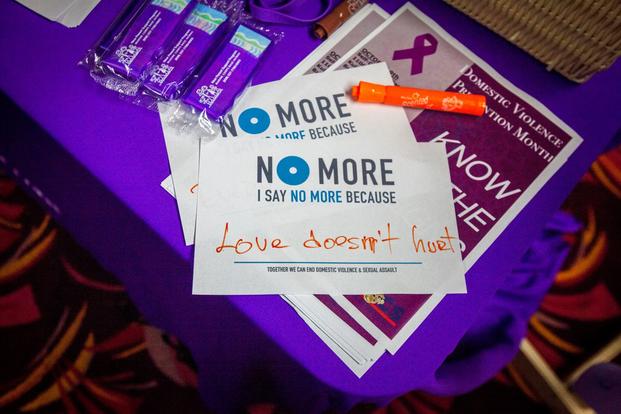Military commanders and law enforcement personnel have been failing to follow their own rules regarding incidents of on-base domestic violence, according a new report from the Pentagon's Office of Inspector General.
Of 219 cases examined at eight installations, 201 were found not to comply with Defense Department policies on how they should be handled, the IG's report states.
The 109-page IG report published April 19 examines domestic violence incidents at eight installations: Fort Bragg, North Carolina; Fort Belvoir, Virginia; Camp Pendleton; Quantico; Joint Base Elmendorf-Richardson, Alaska; Naval Base San Diego, California; Joint Base Andrews, Maryland; and Naval Construction Battalion Center Gulfport, Mississippi.
In a case at JBER, the alleged abuser "held a knife while strangling and threatening the victim. However, law enforcement personnel did not seize the knife used in the assault" for evidence, according to the report.
In another case at Fort Belvoir, the victim lost consciousness during an alleged assault.
"Three children who were with the victim at the time told her what happened during the incident, and she relayed that information to law enforcement," the report states. "However, installation law enforcement personnel did not interview the children to obtain the information directly from them."
Overall, military service law enforcement personnel failed to consistently conduct the thorough interviews needed to provide commanders and prosecutors with the information they needed to make prosecution decisions, the report found.
In addition, investigators and responders were lax in regularly filing incident reports as required to the Defense Central Index of Investigations to allow commanders to take into account an individual's criminal history when making disciplinary decisions and security clearance assessments, according to the report.
It cites a case at Camp Pendleton, California, where a subject allegedly strangled a victim and then threw her to the floor.
"We evaluated the domestic violence incident report and determined that [Naval Criminal Investigative Service] personnel at Camp Pendleton had sufficient credible information that the subject committed a criminal offense," the report states. "However, NCIS personnel at Camp Pendleton did not title and index the subject in the Defense Central Index of Investigations."
The DoD's directives and stated procedures are not at issue, the report says. But, it adds, military law enforcement organizations were found not to follow existing policies consistently regarding domestic violence incidents.
The report warns that the failures to gather evidence and process reports could thwart criminal investigations and even cause added harm to victims.
In another example of where investigators failed to collect crime scene evidence, law enforcement officers at Fort Bragg responded to a report of domestic violence. A cell phone was alleged to hold text messages related to the reported incident.
"The Staff Judge Advocate [SJA] requested the cellular phone be collected to review the digital evidence in order to establish probable cause," the report states. "However, law enforcement personnel did not collect the cellular phone and as a result could not provide the digital evidence to the SJA."
In fact, in 44 cases examined, personnel failed to photograph crime scenes and injures as policy required.
The report cites an incident at Quantico in which the victim alleged that the abuser punched walls and even broke a television.
"However, the incident report did not indicate that law enforcement personnel conducted a crime scene search to identify the property damage nor did the report contain any pictures of the damage," the report states.
Another example cited involved an incident at Fort Belvoir in which "law enforcement personnel responded to a domestic violence incident and did not take pictures of the victim's injuries. According to the incident report, the victim had red circular marks on his right cheek and neck."
"The Fort Belvoir Patrol Captain told us that the non-compliances related to crime scene processing were due to patrol officers not documenting the actions they performed or not having the equipment to complete the actions," the report states.
It adds that the Fort Belvoir Police Chief told investigators that, during the seven-year period assessed, patrol officers did not even always have operational cameras with which to take the photos required when processing crime scenes.
At Gulfport, patrol officers were not even aware of the basics involved in investigating domestic violence, the report states.
A Gulfport Naval Security Officer "told us the patrol officers did not know the requirements for conducting searches, such as knowing what to look for or what to take photographs of in a domestic violence incident," according to the report.
It also notes failures to notify base Family Advocacy Programs (FAP) as required by DoD policy to have them conduct risk assessments for family members. An incident at Fort Belvoir is cited in which a baby was injured.
In the incident, "the subject threw a wine glass in the direction of the victim during an argument. The glass hit the wall instead of the victim, causing a piece of the shattered glass to strike their 18-month-old son in the head," the report states. "This caused a contusion and an inch-sized laceration. However, Fort Belvoir law enforcement personnel did not notify FAP to ensure that the FAP staff members were able to initiate a thorough risk assessment and safety planning for the victim and other family members."
The report makes six recommendations to the secretaries of the Army, Air Force and Navy for prompt action, including making sure that "military service law enforcement practices, equipment, and supervisory reviews are adequate to comply with DoD policies when collecting evidence, conducting interviews" and notifying Family Advocacy Programs of potentially violent situations.
In response, the chief of staff for the Office of the Army Provost Marshal General "stated that the Army is actively pursuing resolution of the DoD OIG's findings through two working groups," according to the report.
However, the Marine Corps' response to the recommendation on timely and accurate reporting of incidents in the Defense Central Index of Investigations was inadequate, it adds.
The branch head of the Marine Corps Law Enforcement, Investigations, and Corrections Branch "did not address the specifics of the recommendation" on reports to DCII, the report states.
-- Richard Sisk can be reached at Richard.Sisk@Military.com.













